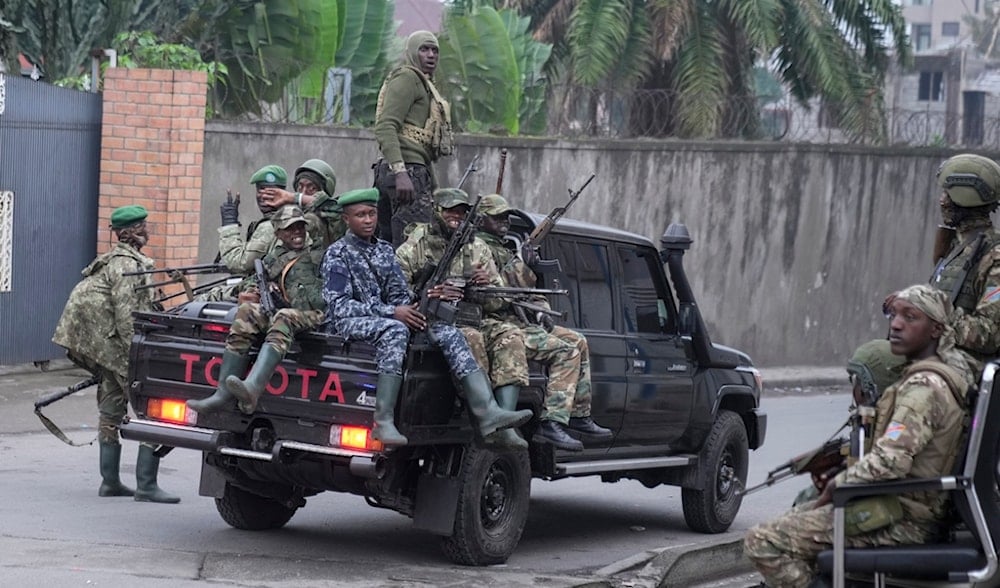Amnesty warns of war crimes committed by M23 in Eastern DRC
Amnesty International accuses M23 of war crimes in eastern DRC, including torture, killings, enforced disappearances, and hostage-taking at detention sites in Goma and Bukavu.
-

M23 rebels patrol the streets of Goma, Democratic Republic of the Congo, Wednesday, January 29, 2025. (AP)
The Rwandan-backed March 23 Movement (M23) has been accused of committing war crimes in eastern Democratic Republic of Congo (DRC), including unlawful killings, torture, enforced disappearances, and the taking of civilians as hostages.
In a new report, Amnesty International said M23 detained civilians under inhumane conditions in Goma and Bukavu, in violation of international humanitarian law.
“M23’s public statements about bringing order to eastern DRC mask their horrific treatment of detainees. They brutally punish those who they believe oppose them and intimidate others, so no one dares to challenge them,” said Tigere Chagutah, Amnesty International’s Regional Director for East and Southern Africa.
Between February and April 2025, Amnesty International interviewed 18 male civilians who had been held in M23 detention sites. Nine of them reported being tortured, while others described witnessing fellow detainees die as a result of beatings and deprivation.
What happens in Goma and Bukavu detention sites?
Detainees reported being held in overcrowded, unsanitary cells without adequate food, water, or medical care. Many were denied contact with their families and held incommunicado.
One former detainee said he saw a man executed after being accused of hiding weapons. Others recounted how detainees were beaten with wooden rods, cables, and metal objects. At least two detainees described witnessing fellow prisoners being killed with hammers.
M23 has used several locations in Goma as detention sites, including the Chien Méchant facility, the provincial assembly building, the 34th military region compound, and the area near the state-run Radio-Télévision Nationale Congolaise (RTNC).
In Bukavu, detainees were held at the main office of the National Intelligence Agency (ANR) and a military camp in Bagira.
Systematic torture
All 18 former detainees said they either experienced or witnessed torture. Beatings were routine, often carried out using electric cables, engine belts, and sticks. Victims were struck on their backs, legs, buttocks, and genitals, leaving lasting injuries. Amnesty International reviewed photos consistent with accounts of torture and confirmed several cases of hospitalization.
One former detainee described a daily ritual where guards would flog prisoners under the guise of morning routines. “They said they were giving us our morning tea,” he said, referring to being whipped 10 times each morning.
Enforced disappearances, arbitrary arrests
Amnesty International also documented enforced disappearances, where families were unable to locate detained relatives. M23 fighters frequently denied having individuals in custody or refused access to them. In some cases, families had to rely on intermediaries to confirm their loved ones were detained.
The arrests were often arbitrary, with M23 accusing civilians of collaborating with the Congolese army, possessing weapons, or criticizing M23 rule. Many detainees said they were never informed of the charges against them.
Hostage-taking and ransom demands
Amnesty International reported that M23 demanded ransoms from families to secure the release of detainees, with amounts ranging from several hundred to over $2,000. Eight former detainees confirmed that their families paid for their release.
One detainee said M23 fighters demanded money from his family without revealing his whereabouts, only releasing him after a payment was made.
Inhumane detention conditions
Conditions in detention sites were described as degrading and life-threatening. In some cells, detainees were forced to sleep standing up due to overcrowding. Food was limited to a daily portion of boiled corn, and there was no access to running water or proper sanitation.
“It was incredibly hot… People were drinking each other’s urine,” one detainee recalled. Toilets were few and frequently clogged, forcing detainees to defecate in makeshift containers.
Amnesty calls for immediate action
Amnesty International has called on M23 to release all arbitrarily detained civilians, disclose the whereabouts of those forcibly disappeared, and provide access to legal counsel and family members. The organization urged independent bodies to be granted access to all detention sites.
“These acts may amount to war crimes,” said Chagutah. “Congolese know all too well the cruelty of M23. They continue to live in misery as international actors have become complacent, waiting patiently for a peace deal while M23 keeps brutalizing Congolese.”
Amnesty also called on regional and international actors to pressure Rwanda to end its support for M23.
Read more: M23 fighters remain in Walikale despite pledge to withdraw

 4 Min Read
4 Min Read









